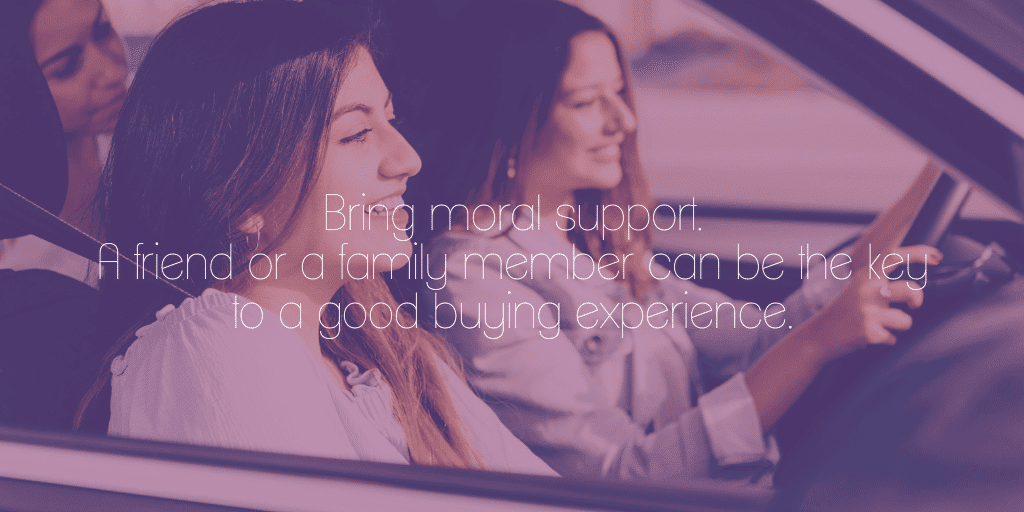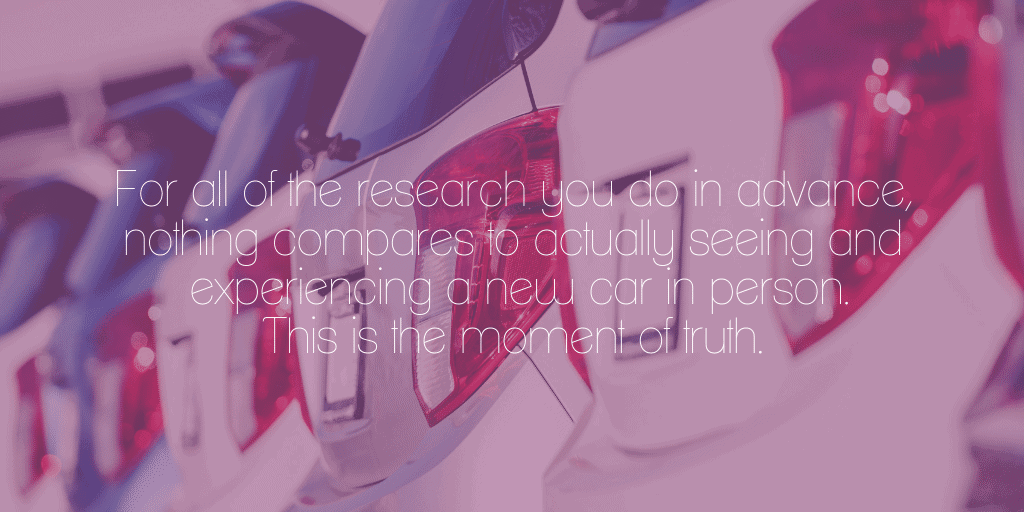Is there a more intimidating shopping experience than buying a car?
Considering that most of us will buy a car in our lifetime, the stress that many feel towards the purchase is extreme. But does it have to be? This three-part series talks about how to research your car-buying, how to have the best experience at a dealership, and how to decide whether new or used is the way to go with a vehicle.
OK, you’ve done your research, identified your perfect car, and are ready to get busy buying. Whether you plan to buy or just comparison-shop, make sure you leave a few hours for the process. This way, you have time to chat with the salesperson, take a look around, complete any needed test drives, and fill out forms for the purchase itself.
Incorporate into your game plan time to step away and carefully consider your purchase. Taking a moment will help calm nerves or buying fever while also maintaining your emotional control to make the best possible decision.
Where to Buy: Online or In Person?
In the past, we had to buy cars – and everything else, for that matter! – in person. Of course, in the last couple of decades, buying things online has becoming increasingly popular. Beyond purchasing books, clothing, and food on the internet, you can also buy cars there, too. But is making such a big purchase online the best option for you?
For the most part, buying a car online is perfectly safe. It’s quick and easy, and you can trust that you’ll get what you paid for. However, there are a few considerations to keep in mind.
First, only buy new cars on the internet; never purchase a used car online. You’ll learn more about buying used cars in the next part of this blog series, but suffice it to say you’ll need to check the car out in person before handing over the cash.
Which brings us to our second point: No matter what you buy, it’s always a good idea to test drive a car before purchasing it. You want to make sure it’s comfortable for you and is easy for you to drive. You can glean a lot online, but this is one thing you’ll have to do onsite.
Whether you buy at a dealership or online is up to you and what fits with your schedule and needs. The rest of this article is geared towards in-person purchases, but know that many of these points will apply to your internet purchase as well.
Don’t Fear the Salesperson
If you decide to buy in person, or simply want to test drive a car before making a purchase, you’ll need to head to a lot. Once there, one of the great things about car-buying that comes into play is the salespeople are very motivated to help you. Generally, someone approaches each customer within a minute or two, and they are ready to help with just about anything. Take advantage of this help, but never forget that they are there to help you. You are the customer and you are in charge!
One thing that may help if you’re still feeling intimidated by this process: Bring moral support. A friend or a family member can be the key to a good buying experience. This person can be knowledgeable about cars or they can be oblivious. Last time I bought a car, for example, I brought along my mother. She doesn’t know any more than I do about car workings and pricing, but she is a great person to discuss any new information.
Your person may be able to help with car details, may be a great negotiator, or she may just be moral support. All are good.
Use Your Research
You did the research about car-buying before you arrived, and you should not be afraid to let the salesperson know about this. Show any print-outs or notes when you sit down and use them to inform the salesperson about exactly what you want.
A good salesperson will roll with this. When presented with information, the best sales technique is to discuss details and any knowledge which might not have been conveyed on the website. Have the prices changed since you did your research? Are there better deals? Seeing what you want, is there another car the salesperson thinks might be more appropriate?
Listen carefully to any advice from your salesperson, but keep in mind that you are the buyer here. The decision is yours — try to ignore any pressure that takes you away from your ideas and make sure you get what you want and not what the salesperson wants to sell you. A good salesperson will happily work with you, but some less-desirable car dealers may need a push.
If you really aren’t getting the service you need, don’t be afraid to ask for someone else to help you. Most car lots have plenty of salespeople to help, and the boss wants to move cars. They will do what’s necessary to get your sale. In the unlikely event that problems continue, always remember that you have the right to walk away.
Use the Salesperson’s Expertise
Even if you identified your perfect car online, be sure to use your time at the lot well. In your salesperson, you have an incredible resource: This is a person who deals in cars for a living and therefore should know more than you about the vehicles.
Ask questions. Ask about any problems drivers have had with the car. Don’t be afraid to ask the salesperson their opinion on various features. Ask if you are correct in your assumptions about what will work for you. Ask anything and everything — it’s the salesperson’s job to talk to you in order to make this sale.
When I bought my last car, I went in with a list of about half a dozen specific vehicles on the lot, thinking that I would probably go with the cheapest model. The salesperson, meanwhile, realized what I was looking for and pointed out that another car — nominally more expensive but on a special sale — might work out better for me. Just relying on my own information would not have led to the best car in this case.
Get Up Close and Personal with Your Prospective Car
For all of the research you do in advance, nothing compares to actually seeing and experiencing a new car in person. This is the moment of truth. Whatever you were expecting, the actual car may be a little different.
Make sure you walk around the car lot for a while. Ideally, your salesperson will go with you and will be able to point out different vehicle features as you walk. When you arrive at each car, check it out with a critical eye while the salesperson provides more information.
Don’t just look though. Driving is not solely a visual experience, so your shopping shouldn’t be either. Have the salesperson open up each car and get in. Adjust the seats. If possible, turn on the car to see how features work. Check out mirrors, control access, and anything else you’ll be using constantly once you drive.
The next step is the test drive. This is the best and most important part of any buying experience, the one that can make or break a car for you. How does the car feel on the road? Do you notice any issues? What are blind spots and other visibility issues like?
One very important thing to consider: Is the car comfortable? A lot of vehicles are built with the idea that all drivers are six-foot-tall men. If that’s not you — and statistically, it’s not — you may need to try a few models to find one where you fit well behind the wheel.
Negotiations
Negotiating with a salesperson can be the most intimidating part of any car purchase, but it doesn’t have to be. A few tips will help make even this part of the process a breeze.
First and foremost, know what you want from any negotiation before you begin. That is where all your research comes in, so make sure you use it. If you know what the price should be, tell the salesperson. List the features you need, and include any costs you expect.
Second, all negotiations are conversations. Listen to what the salesperson has to say, and then make sure you are heard as well. The salesperson needs you to stay long enough to make a sale, so you have the power here.
Finally, you don’t have to negotiate if you don’t want to. Thanks to all of your pre-buying research, you should know what a car is going to cost. Let the salesperson know what you will be paying — and that you know what the price should be — and you can skip most of the negotiating.
Time to Buy
When everything seems right with the car, it is time to buy! Due to all of the necessary paperwork, this can unfortunately be the longest and most tedious part of the process.
You may have determined your financing beforehand. If so, that’s great! If not, it is far from the end of the world. Dealerships have pre-set relationships with lots of lenders, and they can help find the best financing on-the-spot. I needed financing assistance with my last two cars and got good deals both times through the dealership’s lending expert. Calls were put in to find the best interest rates (once through a credit union, the other time through the manufacturer), and they were able to draw up all of the paperwork immediately.
Read everything carefully, paying particular attention to things like your monthly payments and the length of the payment plan. When everything looks good and you sign, the payment process moves quickly!
Depending on the dealership and the type of car, you may need to deal with additional paperwork and costs for things like warranties and service plans. Oftentimes, the car salesperson will encourage you to take on additional services and extended warranty package you probably don’t need. These extras are always your decision, though, so think about your future with the car and how much risk you’re willing to take on. Your careful research will pay off big time.
You Have a Car!
After this whole process, it can be a bit surprising when you actually buy your car. Are you done? Mostly, you are. Keeping in mind that you will need to get insurance set up as soon as possible, you usually can expect to drive away from a dealership in your newly purchased car!
Now that you’ve finished the first two parts of our How to Buy a Car series, get ready for the third and final installment, Part 3: “Ultimate Advice on New or Used,” coming out on Tuesday, October 2nd.
Resources
https://web.consumerreports.org/cars/
Petite2Queen provides virtual mentoring to young women in life, at work, and in sales. Follow us for more practical advice you can put to use to improve your life and career.
Laurel Brown is a writer and social-media expert. Ridiculously over-educated, she has an undergraduate degree in astrophysics from Colgate University and graduate degrees in Middle Eastern studies from Columbia University. When not playing professor or interviewing Hollywood celebrities for online publications, Laurel’s career included a stint in marketing at a Fortune 500 company. She is now pursuing a law degree in an attempt to become a true Renaissance woman.





